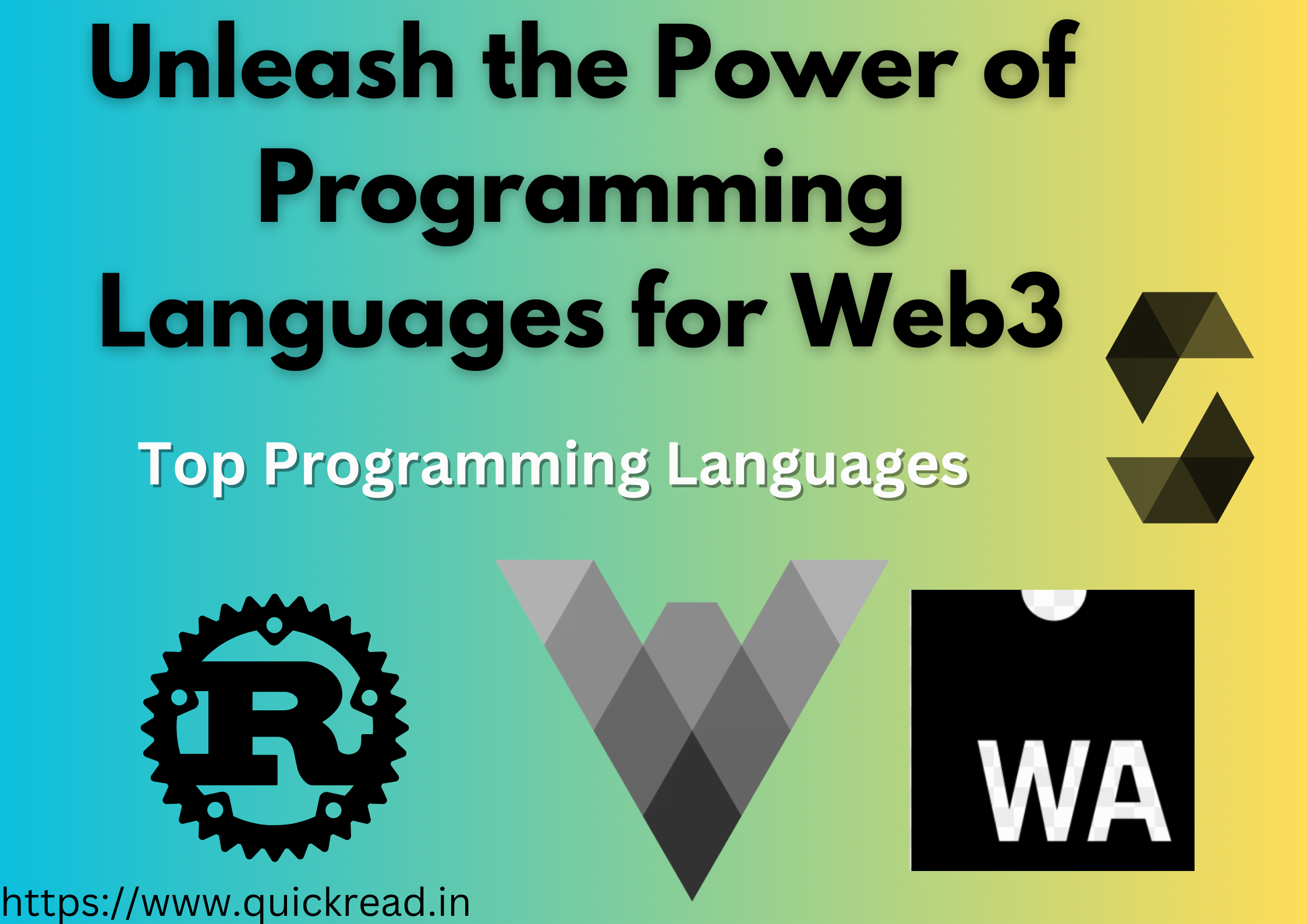Last updated on July 3rd, 2023
Introduction
Programming Languages for Web3: With the introduction of Web3 technologies, the digital environment is going through a substantial transition. As content writers, it is essential to understand the programming languages that are revolutionizing Web3 and enabling the development of decentralized applications, smart contracts, and blockchain-based solutions. In this article, we will explore the top programming languages that are shaping the Web3 ecosystem and revolutionizing the way we interact with the Internet. Let’s dive in!
The Rise of Web3: Programming Languages for Web3
Understanding Web3
Web3 refers to the next phase of the internet, where decentralized technologies like blockchain empower users with greater control over their data and digital assets. It envisions a digital ecosystem that is more open, safe, and user-focused.
The Need for New Programming Languages
With the advent of Web3, traditional programming languages faced limitations in addressing the unique requirements of decentralized systems. This gave rise to a new generation of programming languages specifically designed for Web3, offering improved security, scalability, and interoperability.
Solidity: Enabling Ethereum Smart Contracts
Solidity: A Language for Smart Contracts
Website: Solidity
Solidity is a programming language specifically developed for writing smart contracts on the Ethereum blockchain. It is a statically-typed language that provides developers with the tools and syntax to define the behavior of decentralized applications and automate transactions securely.
Key Features of Solidity
Solidity’s rich feature set includes support for contract inheritance, libraries, and user-defined types. It also incorporates Ethereum-specific functionalities such as events, modifiers, and the ability to interact with other contracts. These features make Solidity a powerful language for building complex decentralized applications and facilitating Web3 transactions on the Ethereum network.
Solidity Code Example
contract SimpleStorage {
uint256 private data;
function setData(uint256 _data) public {
data = _data;
}
function getData() public view returns (uint256) {
return data;
}
}Rust: Security and Performance for Web3
Rust: A Systems Programming Language
Website: Rust lang
Rust is a systems programming language that combines performance, safety, and concurrency. It is gaining popularity in the Web3 ecosystem due to its focus on security and efficiency.
Safety and Memory Management
Memory safety is guaranteed by the ownership system in Rust without the use of a garbage collector. It imposes stringent compile-time checks to stop typical programming problems like buffer overflows and null pointer dereferences. This level of safety is crucial for handling sensitive transactions in Web3 environments.
Concurrency and Performance
Rust’s lightweight concurrency model allows developers to write highly concurrent code without compromising safety. Additionally, its zero-cost abstractions and efficient memory management make it well-suited for resource-constrained environments like blockchain networks. Rust empowers developers to build high-performance Web3 applications that can handle a significant number of transactions.
Vyper: Simplicity for Ethereum Contracts
Vyper: A Pythonic Smart Contract Language
Website: Vyper
Vyper is a high-level smart contract language that targets the Ethereum Virtual Machine (EVM). It focuses on simplicity, readability, and security, making it an excellent choice for developers who prioritize auditability and correctness.
Readability and Security
Vyper’s syntax resembles Python, making it easy to learn and read for developers familiar with the language. It intentionally restricts certain features and enforces best practices to minimize potential security vulnerabilities. Vyper’s emphasis on security helps developers write reliable and secure smart contracts for Web3 transactions.
Vyper Code Example
# SPDX-License-Identifier: GPL-3.0-or-later
@public
def add(a: int128, b: int128) -> int128:
return a + b
WebAssembly: Multi-Language Support for Web3
WebAssembly: A Universal Binary Format
Website: WebAssembly
WebAssembly (Wasm) is a binary instruction format designed to run efficiently on the web. It enables the execution of code written in multiple programming languages within a single blockchain ecosystem.
Interoperability and Portability
WebAssembly allows developers to write smart contracts and decentralized applications in various programming languages, such as Rust, C++, and TypeScript. This interoperability fosters collaboration, as developers can leverage their preferred languages while benefiting from the features of the Web3 ecosystem. It also enhances portability, enabling code reuse across different blockchain platforms.
FAQs (Frequently Asked Questions)
Q1: What are the top programming languages for Web3?
A: The top programming languages for Web3 development include Solidity, Rust, Vyper, and WebAssembly.
Q2: How does Solidity contribute to Web3?
A: Solidity is specifically designed for writing smart contracts on the Ethereum blockchain. It enables developers to define the behavior of decentralized applications and automate transactions securely.
Q3: Why is Rust gaining popularity in Web3 development?
A: Rust is known for its focus on security, performance, and concurrency. It offers memory safety without a garbage collector and allows developers to write high-performance code for Web3 applications.
Q4: What advantages does Vyper offer for Ethereum contracts?
A: Vyper is a high-level smart contract language that emphasizes simplicity, readability, and security. It restricts certain features to minimize security vulnerabilities and supports Python-like syntax.
Q5: How does WebAssembly enhance Web3 development?
A: WebAssembly enables the execution of code written in multiple programming languages within the Web3 ecosystem. It promotes interoperability, collaboration, and code reuse across different blockchain platforms.
Q6: What is the future of programming languages in Web3?
A: As Web3 technologies continue to evolve, programming languages will play a crucial role in shaping the decentralized landscape. Languages that prioritize security, scalability, and developer experience are expected to gain prominence.
Conclusion
The Web3 revolution is fueled by the innovation of next-generation programming languages. Solidity, Rust, Vyper, and WebAssembly are empowering developers to build decentralized applications, write secure smart contracts, and enable seamless Web3 transactions. By harnessing the capabilities of these languages, we are revolutionizing the way we interact with the digital world, creating a more transparent, secure, and user-centric future.



